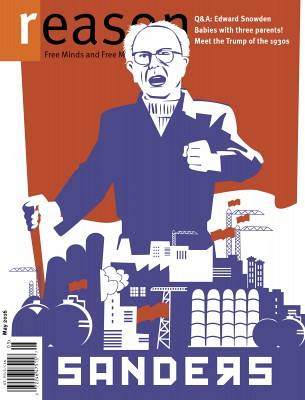Bernie Sanders Wanted 'Public Ownership of the Major Means of Production' in 1976
There's a word for that….


We have long known that Sen. Bernie Sanders (I-Vt.) has bad economic ideas, which have sadly been mainstreamed within the modern Democratic Party. We have further known that the democratic socialist at the outset of his political career in the 1970s had some, ah, unusual enthusiasms, ranging from widening freeway on-ramps for hitchhikers to the "abolition of all laws which interfere with the Constitutional right of citizens to bear arms"(!). Sanders described himself in 1976 as "clearly anti-capitalistic," and was prone that decade and others hence to embarrassing apologia for communist countries.
Still, reading today's tranche of '70s Bernie-brainfartery from CNN outrage-archeologists Andrew Kaczynski and Nathan McDermott is a striking reminder, against our current backdrop of Green-New-Deal-progressive-one-upsmanship, that the foundation of Sanders's political thinking is a pile of truly garbage economics that he refuses to disavow even while distancing himself from some of its particulars.
"I favor the public ownership of utilities, banks and major industries," Sanders told the Burlington Free Press in October 1976, at age 35, while making the last of four failed runs for office that decade. "There is a handful of people sitting at the head of the main banks controlling the destiny of underprivileged nations, the country as well as Vermont's economy. That is not tolerable. That control cannot be held by them. We need public control over capital; and the capital must be put to use for public need not for the advancement of those who made the investments."
When pointed out by the interviewer that "That is Socialism," Sanders replied "Of course. But that word has so many connotations—like 'capitalism'—that it has almost ceased to mean anything."
Well, yes and no. Pretty much every definition you can find of socialism, then as now, involves public ownership of the means of production. Which is precisely what 1976 Bernie was advocating.
"We have got to begin to deal with the fact that corporations do not have the god-given right to disrupt the lives of their workers or the economic foundation of their towns simply because they wish to move elsewhere to earn a higher rate of profit," he said in a CNN-unearthed press release in August 1976. "In the long run, the problem of the fleeing corporations must be dealt with on the national level by legislation which will bring about the public ownership of the major means of production and their conversion into worker-controlled enterprises."
Bolding mine, to emphasize #Socialism.
It is true, and important, that contemporary Sanders and his emulators have long since discarded the general means-of-production bit, though occasionally they have to confront the fact that their vast economic wishlists will replace entire industries with a single government provider. But the most damning of the CNN findings is actually the freshest of the quotes, from campaign spokesman Josh Orton:
Throughout his career, Bernie has fought on the side of working people and against the influence of both the powerful ultra-rich and giant corporations who seek only to further their own greed. The record shows that from the very beginning, Bernie anticipated and worked to combat the rise of a billionaire ruling class and the exploding power of Wall Street and multinational corporations. Whether fighting to lower energy prices or expand access to capital for local development, Bernie's first priority has always been—and will always be—defending the interests of working people across the country.
That's a funny way of saying I was wrong.
Look, there's no sugarcoating a basic fact of the last 100 years of human existence: Public ownership of the means of production has been one of the most wicked, misery inducing, environment-poisoning, dictator-enabling, freedom-destroying Frankenstein experiments ever inflicted on humankind. This was evident not just in the mid-1970s, but by the late 1930s, among anyone who cared enough to read widely available non-propaganda on the subject. Imagine being so blinkered by your wrongheaded economic priors that you travel to its most imperial practitioner, in its waning days, and laud the "cultural programs that go far beyond what we do in this country":
Bernie Sanders was lucky to be able to get to the Soviet Union in 1988 and praise all its stunning socialist achievements before the entire system and empire collapsed under the weight of its own spectacular failures. pic.twitter.com/bENmwVKi0g
— Carl Bildt (@carlbildt) February 25, 2019
The adult thing to do when the world demonstrably proves the monstrousness produced by the same ideas and regimes that you recently issued qualified praise for, is to take a step back, stock up on the new information, adapt your ideas accordingly, and if appropriate, apologize. It is not to quietly discard some of the excesses and otherwise insist that you've been with the proletariat all along. No. Really existing socialism makes workers poorer and less free, as predictably as night follows day.
Something reasonably close to the inverse happens as well: When you move toward private ownership and free trade, you get such results as the modern miracle of one billion people lifted out of extreme poverty since Bernie's last visit to the Soviet Union. (This hasn't led to as much political freedom as one would hope, particularly in China, but citizens there have considerably more latitude than in 1989.) As Bono knows, but Bernie (and the Pope!) refuse to believe, entrepreneurial capitalism, and the kind of mutual tariff-reduction Sanders has opposed at every opportunity during his long career, have been the primary engines fueling global anti-poverty.
So yeah, we knew Sanders had some weird—including some good!—ideas in the 1970s, and '80s, and even to this day. He is right about wanting to roll back both the Drug War and our Forever War. His spinoff from Seinfeld sure has been funny. But as Glenn Garvin pointed out in a great Reason profile from 2016, Bernie has been yammering about "oligarchy" and clamoring for "worker-owned businesses" for going on a half-century now, with little evident sign of self-reflection as the world disproved socialism on his watch. As pretty much the only alternative to the unlovable power-politician Hillary Clinton, Sanders was able to easily absorb flak about his past errors of judgment. But in a crowded Democratic field that includes at least some token self-described "capitalists," Bernie's bad ideas, past and present, are likely to get a far more thorough examination.


Show Comments (65)